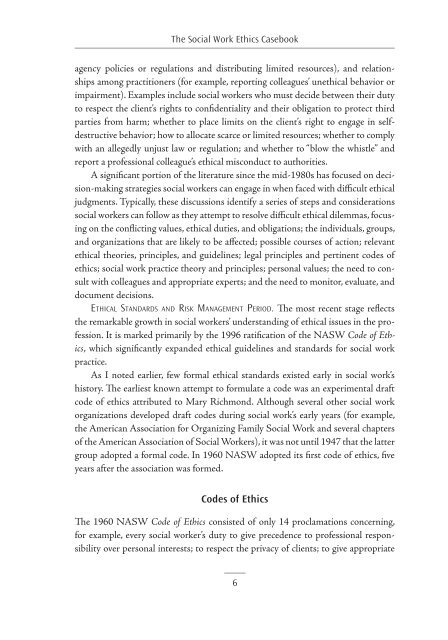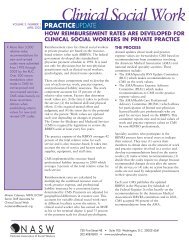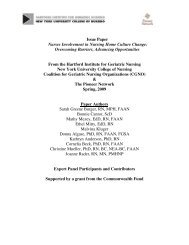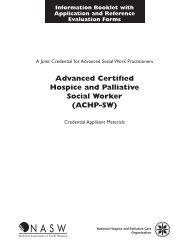The Nature of Social Work Ethics - National Association of Social ...
The Nature of Social Work Ethics - National Association of Social ...
The Nature of Social Work Ethics - National Association of Social ...
Create successful ePaper yourself
Turn your PDF publications into a flip-book with our unique Google optimized e-Paper software.
<strong>The</strong> <strong>Social</strong> <strong>Work</strong> <strong>Ethics</strong> Casebookagency policies or regulations and distributing limited resources), and relationshipsamong practitioners (for example, reporting colleagues’ unethical behavior orimpairment). Examples include social workers who must decide between their dutyto respect the client’s rights to confidentiality and their obligation to protect thirdparties from harm; whether to place limits on the client’s right to engage in selfdestructivebehavior; how to allocate scarce or limited resources; whether to complywith an allegedly unjust law or regulation; and whether to “blow the whistle” andreport a pr<strong>of</strong>essional colleague’s ethical misconduct to authorities.A significant portion <strong>of</strong> the literature since the mid-1980s has focused on decision-makingstrategies social workers can engage in when faced with difficult ethicaljudgments. Typically, these discussions identify a series <strong>of</strong> steps and considerationssocial workers can follow as they attempt to resolve difficult ethical dilemmas, focusingon the conflicting values, ethical duties, and obligations; the individuals, groups,and organizations that are likely to be affected; possible courses <strong>of</strong> action; relevantethical theories, principles, and guidelines; legal principles and pertinent codes <strong>of</strong>ethics; social work practice theory and principles; personal values; the need to consultwith colleagues and appropriate experts; and the need to monitor, evaluate, anddocument decisions.ETHICAL STANDARDS AND RISK MANAGEMENT PERIOD. <strong>The</strong> most recent stage reflectsthe remarkable growth in social workers’ understanding <strong>of</strong> ethical issues in the pr<strong>of</strong>ession.It is marked primarily by the 1996 ratification <strong>of</strong> the NASW Code <strong>of</strong> <strong>Ethics</strong>,which significantly expanded ethical guidelines and standards for social workpractice.As I noted earlier, few formal ethical standards existed early in social work’shistory. <strong>The</strong> earliest known attempt to formulate a code was an experimental draftcode <strong>of</strong> ethics attributed to Mary Richmond. Although several other social workorganizations developed draft codes during social work’s early years (for example,the American <strong>Association</strong> for Organizing Family <strong>Social</strong> <strong>Work</strong> and several chapters<strong>of</strong> the American <strong>Association</strong> <strong>of</strong> <strong>Social</strong> <strong>Work</strong>ers), it was not until 1947 that the lattergroup adopted a formal code. In 1960 NASW adopted its first code <strong>of</strong> ethics, fiveyears after the association was formed.Codes <strong>of</strong> <strong>Ethics</strong><strong>The</strong> 1960 NASW Code <strong>of</strong> <strong>Ethics</strong> consisted <strong>of</strong> only 14 proclamations concerning,for example, every social worker’s duty to give precedence to pr<strong>of</strong>essional responsibilityover personal interests; to respect the privacy <strong>of</strong> clients; to give appropriate6
















